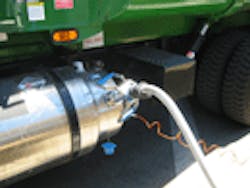As the cost of oil, along with diesel and gasoline prices, is expected to remain high for the foreseeable future, state governments are stepping up legislative efforts to promote alternative fuel use in the U.S. – especially natural gas.
Currently, 23 state legislatures are considering bills that support natural gas as a transportation fuel, with Wyoming appropriating $200,000 for its Dept. of Transportation and Dept. of Administration and Information to retrofit or acquire vehicles in their fleets capable of running on natural gas, according to the trade association NGVAmerica.
“There is growing recognition of the growing importance state government’s play in promoting alternative fuel usage,” Denise McCourt, director of communications for NGVAmerica, told Fleet Owner. “What’s driving this now is the experience with oil price spikes – the realization that oil is traded as a commodity, with pricing set by the global market and subject to surges not directly related to pure supply and demand factors.”
McCourt said that the current upswing in oil prices, which is pushing diesel and gasoline costs higher, is the third such upsurge in the last six years. The first came after Hurricane Katrina in 2005, based largely on fears of reduced refinery capacity along the U.S. Gulf Coast, with the second occurring during the summer in 2008.
Current projections by the U.S. Energy Information Administration (EIA) indicate the current run up in oil and petroleum-based fuel prices won’t abate soon, either. The agency expects continued tightening of world oil markets over the next two years, particularly in light of the recent events in North Africa and the Middle East, the world’s largest oil producing region.
“The current situation in Libya increases oil market uncertainty because … much of the country’s 1.8-million barrel per day (b/d) total liquids production has been shut in and it is unclear how long this situation will continue,” EIA said in its short-term energy outlook released this week. “The market remains concerned that the unrest in the region could continue to spread.”
As a result, EIA has raised its forecast for the average cost of crude oil to refiners to $105 per barrel in 2011, $14 higher than its previous predictions, with a further small increase in crude oil prices in 2012, with the refiner acquisition cost for crude oil averaging $106 per barrel and the West Texas Intermediate (WTI) crude oil benchmark price averaging $105 per barrel.
“Motorists currently experiencing a jump in [fuel] pump prices will likely see further increases from now through the spring since the recent increase in crude oil prices has not yet been fully passed through to gasoline prices,” the agency added.
EIA expects the retail price of regular-grade motor gasoline to average $3.56 per gallon in 2011, 77 cents per gallon higher than the 2010 average and about 40 cents above the projected price from its previous outlook, with the current market prices of futures and options contracts for gasoline suggesting a 25% probability that the national monthly average retail price for regular gasoline could exceed $4 per gallon by summer.
The forecast for on-highway diesel fuel retail prices, which averaged $2.99 per gallon in 2010, is projected to reach a $3.81 per gallon average across the U.S. this year and $3.82 per gallon in 2012, the agency said.
That outlook is but one reason Richard Kolodziej, president of NGVAmerica, believes state governments are pushing bills to beef up alternative fuel usage now, although the small time windows to pass legislation into law – 90 to 120 days for most states – could prove to be a stumbling block.
"Over the past few years, we’ve seen a steady growth in interest in natural gas vehicles from government and private fleets,” he said. “But with the recent spike in gasoline and diesel prices, we’re seeing an even bigger spike in fleet calls. Saving over $1 per gallon in fuel cost has gotten everyone’s attention.”
Currently, about 110,000 vehicles run on natural gas in the U.S., he said, with most of them fleet vehicles, including natural gas powered buses and several large commercial fleets, such as UPS, AT&T and Verizon. Transit fleets are the biggest consumers of natural gas as a transportation fuel. The fastest growing segment of natural gas vehicles is in the refuse market, Kolodziej added.
NGVAmerica’s McCourt also noted that the move by many fleet operations to build more publically assessable natural gas refueling stations with grants from both state and federal sources is another critical piece of this alternative fuel push.
“In the past, such refueling sites were often ‘behind the fence,’ available only to the fleets using natural gas,” she said. “Now we’re seeing a more concentrated effort by fleets such as UPS to establish refueling locations for their operations that the public can use – something that could really help encourage more widespread adoption of natural gas vehicles by the everyday motorist.”
About the Author
Sean Kilcarr
Editor in Chief
Sean Kilcarr is a former longtime FleetOwner senior editor who wrote for the publication from 2000 to 2018. He served as editor-in-chief from 2017 to 2018.
